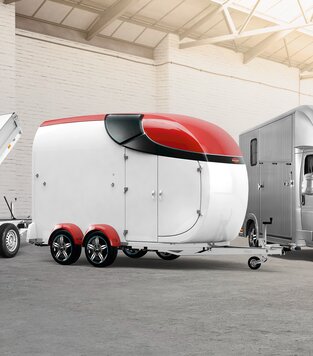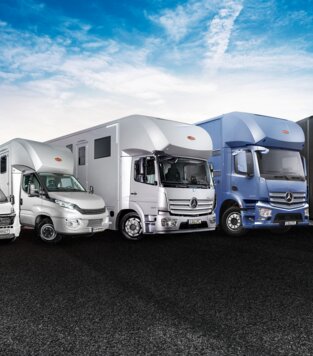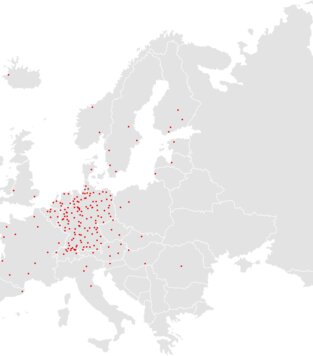Rental conditions
Böckmann Fahrzeugwerke GmbH
Find out everything about our rental conditions for car and horse trailers as well as horse transporters
1. Scope of the rental conditions and conclusion of the contract
1.1 The rental conditions apply to rental agreements for passenger car trailers, trucks, and other vehicles offered by the lessor for temporary transfer (hereinafter referred to as "vehicle") between the renter along with the authorized drivers named in the rental agreement and the contracting company. The lessor of the vehicle is the company named in the rental agreement. Furthermore, the insurance conditions of the insurer with whom the vehicles are insured apply.
1.2 The offers of the lessor are non-binding. The contract is only concluded when both parties have signed the agreement. The lessor is therefore only obliged to transfer the vehicle when the rental agreement has been signed by both partie
2. Authorization to use
2.1 Only the drivers named in the rental agreement are authorized to use the rental vehicle.
2.2 If the renter is a legal entity, only the persons named in the rental agreement are authorized to use the vehicle, provided they have a valid driver's license (hereinafter also referred to as "authorized driver"). The renter is obliged to check whether the authorized drivers have a sufficient and valid driver's license.
3. Rental duration and rental prices
3.1 The rental period begins on the handover date agreed in the rental agreement and ends on the return date agreed in the rental agreement. The rental begins and ends at the return location specified in the rental agreement. The renter is obliged to return the vehicle punctually by the end of the agreed return time. An early termination of the rental agreement is only possible with the consent of the lessor. Ordinary termination before the end of the rental period is excluded. The right to extraordinary termination remains unaffected.
3.2 If the renter does not return the vehicle by the agreed return time, the lessor may charge a late fee. The amount of the late fee is based on the agreed rental price and amounts to a daily rate for each commenced 24 hours of delay. If no specific daily rate has been agreed between the parties, the amount of the late fee owed by the renter shall be based on the rental price agreed for the duration of the transfer. Any further claims for damages incurred by the lessor due to a late return remain unaffected.
3.3 The renter owes the prices agreed in the rental agreement. In addition, the renter owes the flat rates mentioned in these rental conditions, provided the conditions for this are met.
3.4 The rental prices include tax, liability insurance, and oil.
3.5 If the vehicle is returned in a dirty condition, the renter owes a cleaning flat rate as follows: €50.00 for box trailers, €100.00 for box and horse trailers, €120.00 for compact horse transporters, €180.00 for performance transporters, and €240.00 for equipe vehicles. The renter may prove that the lessor has incurred less or no damage. The lessor reserves the right to prove a higher damage.
3.6 The lessor is entitled to demand a rental advance payment or a deposit before the start of the journey.
3.7 The rental car costs are due as soon as the rental agreement is concluded and the vehicle has been handed over.
4. Return
4.1 The renter must return the vehicle in a roadworthy condition and with all provided keys, vehicle documents, and a full tank to the rental station named in the rental agreement during the normal opening hours of the lessor. If such a location is not agreed upon, the return takes place at the lessor's headquarters in Lastrup. The vehicle must be cleaned before return.
4.2 If the renter returns the vehicle late or in a dirty condition, the renter owes the lessor the late fee or the cleaning flat rate mentioned in these rental conditions.
5. Obligations of the renter
5.1 The renter undertakes to use the vehicle properly and gently and to behave in a manner that ensures operational and traffic safety. He undertakes to observe all relevant legal provisions and official regulations as well as the manufacturer's operating instructions. If external conditions (e.g., space and visibility conditions) require it, the renter is obliged to have a third party assist him when reversing.
5.2 The renter is solely responsible for the proper roadworthy condition of the rental object during the rental period. He indemnifies the lessor from all related claims. This also applies in cases where the main inspection, the tachograph, or the safety inspection becomes due during the rental period. In addition, the renter must ensure that the tires are suitable for the weather conditions. The renter is obliged to use the vehicle only if the vehicle's equipment or tires ensure a roadworthy journey according to the weather conditions and legal regulations – also at the place of use.
5.3 During the rental period, the responsibility for the complete maintenance of the rental object lies with the renter, as well as any follow-up costs for neglected maintenance. Maintenance instructions must be observed, and a corresponding specialist workshop must be consulted. The renter is obliged to check and adjust the oil and water levels as well as the tire pressure before starting the journey, taking into account the load. The renter is responsible for using approved fuels and lubricants. The lessor does not grant approval for biodiesel.
5.4 If the use of the vehicle is subject to further legal provisions, the renter is responsible for complying with these provisions during the period in which he or one of his authorized drivers is in possession of the vehicle. In particular, the renter must observe and pay all legal provisions of freight transport, driving time regulations, Toll-Collect GmbH, and toll operators. Violations or reports will be immediately forwarded by the lessor to the renter for processing and assumption of responsibility. The relevant authority will be informed of the renter's address at the time of the respective incident.
5.5 For vehicles with a digital tachograph, it is the renter's responsibility to ensure that the driver taking over the vehicle possesses a corresponding driver card. Before taking over the object using his company card, the renter must activate the digital control device for his company and block the data on the device for third parties upon return of the object. The lessor is not liable if renter-related data can be read by third parties.
5.6 While the vehicle is registered in the renter's name, he is obliged to ensure the download and backup of the data. The download must take place every 3 months. The archiving of the data must be done on a separate data carrier.
5.7 For the use of vehicles with a digital or analog tachograph, compliance with the legal provisions is solely the responsibility of the renter. In case of violations, he bears sole liability.
5.8 Repairs to the vehicle may only be carried out with the written consent of the lessor and only by a workshop approved by the lessor.
6. Prohibited uses
6.1 It is prohibited to use the vehicles contrary to the respective valid insurance conditions. Furthermore, the renter may not sublet or otherwise transfer the vehicle to third parties. In addition, the vehicle may not be used beyond the contractually specified use, in particular, the vehicles may not be used to participate in vehicle tests and events such as driving safety training and motorsport. The transport of flammable, toxic, or other hazardous materials as well as of goods requiring documentation, securities, or money without valid accompanying documents is prohibited.
6.2 The renter may only undertake trips abroad with the vehicle if the lessor has given written consent.
6.3 The renter is not entitled to remove seals from distance recorders, the distance recorder shaft, or the tachograph. In the event of failure of these devices, the renter is obliged to notify the lessor immediately. The lessor will assign the renter a suitable workshop to remedy the damage. The mileage of the tachograph must be reset to the previous mileage. The distance traveled without counting must be communicated to the lessor in text form. Repaired devices must be resealed.
7. Handling of damages, defects, and accidents
7.1 If damages or defects occur during the journey that are not recorded in the damage report or if the vehicle is involved in an accident, the renter must notify the lessor immediately. Further travel is only permitted with the express consent of the lessor, which may not be unreasonably withheld. If the lessor cannot rule out that the roadworthiness of the vehicle is impaired or that the current condition of the vehicle must be secured for evidentiary purposes (e.g., due to an accident), the lessor may refuse use until a person commissioned by the lessor gives consent for further use of the vehicle. The renter is obliged to do everything to limit the damage.
7.2 After an accident or theft of the vehicle or vehicle parts, the renter must immediately inform the police and the lessor. Liability for the accident and/or other third-party claims must not be acknowledged. Further travel is only permitted with the consent of the lessor. If obtaining consent is not possible, the renter is responsible for further travel. The renter is obliged to support the lessor to a reasonable extent in clarifying the accident or in the event of theft.
8. Liability of the renter
8.1 The renter is liable to the lessor according to the statutory provisions if the vehicle is damaged or stolen or if vehicle parts go missing during the rental period. In addition, the renter is liable if he causes damage to third parties with the rented vehicle, damages third-party property, or violates his obligations under this contract.
8.2 The liability of the renter is limited in cases where clause 8.1 applies to the amount of any agreed deductible, provided the vehicle is used in accordance with the contract and the damage is reported immediately, unless excluded in the following provisions. The liability of the authorized driver extends to the amount of the agreed deductible also for ancillary damage costs such as: expert costs, towing costs, depreciation, loss of rental income, increased insurance premiums, damage buybacks from the insurer to avoid premium increases, and additional administrative costs.
8.3 The limitation of liability to the amount of the deductible in clause 8.2 does not apply in the event of damage caused by the authorized driver due to improper handling or incorrect use. Any limitation of the deductible agreed with the lessor in the event of damage does not apply. If damage is only reported by a later renter, the renter is liable if the damage could not have been caused by third parties outside the booking period on the stationary vehicle.
8.4 The renter is fully liable to the lessor if the damage was intentionally caused. If the damage was caused by gross negligence, the lessor is entitled to demand the total amount that was not reimbursed to the lessor by the fully comprehensive insurance that may exist for the vehicle, regardless of the agreed deductible. If the renter intentionally or grossly negligently disregards the provisions of the rental conditions or the relevant insurance conditions, he is also fully liable to the lessor.
8.5 The renter is liable for the fault of the authorized driver to the same extent as for his own fault. The renter and the authorized driver are jointly liable in the event of the authorized driver's fault.
9.Liability of the lessor
9.1 The lessor's liability without fault according to § 536a Abs. 1 BGB for existing material defects at the conclusion of the rental agreement is excluded. This exclusion of liability does not apply if the lessor has guaranteed a specific property of the vehicle or has fraudulently concealed a defect in the vehicle.
9.2 The lessor is liable in cases of intent or gross negligence of the lessor, a representative, or a vicarious agent according to the statutory provisions. In cases of simple negligence, the lessor is only liable for damages resulting from injury to life, body, health, or culpable violation of essential contractual obligations. Essential contractual obligations are those whose fulfillment enables the proper execution of the contract and on whose compliance the respective party regularly relies and may rely (hereinafter referred to as "cardinal obligations"). The claim for damages due to violation of a cardinal obligation is limited to the contract-typical, foreseeable damage.
9.3 All exclusions of liability and limitations of liability in this contract do not apply in the event of injury to body, life, health, or in the case of liability under the Product Liability Act. In this respect, the statutory provisions apply.
10. Final provisions
10.1 The place of performance is the registered office of the lessor.
10.2 The law of the Federal Republic of Germany applies.
10.3 The exclusive place of jurisdiction for all legal disputes arising from or in connection with this contract is the registered office of the lessor, provided the renter is a merchant, a legal entity under public law, or a special fund under public law, or if he relocates his residence or habitual residence from the domestic country after the conclusion of the contract or if his residence or habitual residence is not known at the time of the lawsuit.



